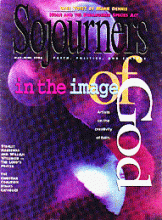Who would have thought it! At a time when there seem to be no effective taboos-every permutation of violence, vulgarity, and self-actualizing confessional seems permissible, every act of bad faith tolerable if it makes you feel good-Jane Austen's novels are hot! In rapid succession, television has shown Pride and Prejudice, Emma has been retooled as the movie Clueless, and Persuasion and the wildly successful Sense and Sensibility have shown up on the big screen, the latter winning the Academy Award for best adapted screenplay. What in the world is going on here?
Sense and Sensibility, based on Jane Austen's 1811 novel, follows two sisters, played by Emma Thompson (who also wrote the screenplay) and Kate Winslet, as they pursue the only available vocation-marriage. The plot, which turns on convolutions of family and community connection, provides a discussion of love-what it is and how one knows what it is.
The sisters, not being independently wealthy, must marry, in part but not only for economic reasons. The younger, Marianne, mistaking the good looks and attentions of the stranger Willoughby for honorable character, does not know that he has, for his own pleasure, ruined at least one young woman. Col. Brandon, the neighbor who quietly loves Marianne, embodies real excellence of character. Not wanting to hurt her, he does not pour out effusions of sentiment. He is a steady man, valued and esteemed by all who know him.
Marianne believes that the display of emotion, the "superficial sensibility," is paramount, but these values turn out to be both false and humiliating. Elinor, on the other hand, who embodies "sense," suffers the misbegotten engagement of her beloved to another with fortitude and discretion. Reserve, honor, and duty are the virtues that make honorable love possible.
Read the Full Article
